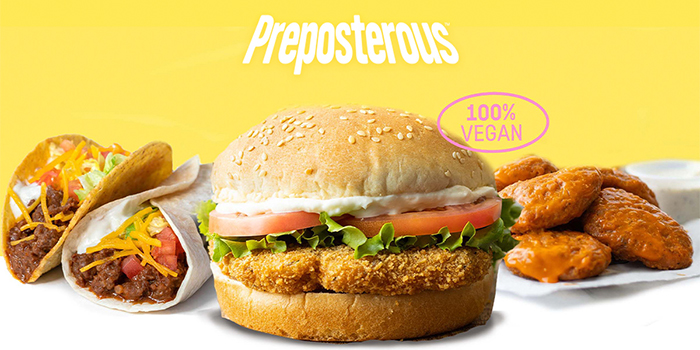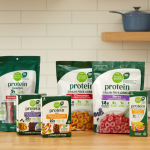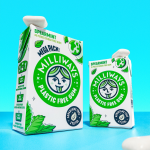Odd Burger Launches Preposterous Foods To Expedite Growth

Canadian quick-service restaurant chain Odd Burger is expanding its reach in the foodservice industry with the introduction of Preposterous Foods, a line of fast-food style plant-based proteins and dairy-free sauces. The line is available to foodservice operators across Canada and will soon expand to the United States through an agreement with Sysco.
The launch comes at a time of significant growth for Odd Burger, which is currently working to nearly double its QSR footprint with the addition of six new locations across Canada in Calgary, Victoria, Ottawa, Whitby, Brampton and Toronto (Broadview). While this new food service-oriented brand may seem like Odd Burger has just given away its secret sauce, the company said it sees the launch of Preposterous as an opportunity for broader distribution and rapid growth.
“The opportunity is tremendous, as the plant-based food service industry is under-serviced with products that are specifically designed for food service use,” said James McInnes, co-founder and CEO of Odd Burger.
Preposterous’ lineup includes ten plant-based products across a range of categories including a crispy “chickUN” burger, Gyro Meat, Fennel Sausage Patties and dairy-free Ranch dressing. The vegan-friendly line is made with ingredients such as chickpeas, oats and wheat gluten.
Boasting many of the same “minimal-ingredient, minimally-processed” products found at Odd Burger locations, McInnes said launching with a wide assortment of Preposterous products will allow its new external partners to easily create new menu options without having to research different suppliers. He noted that while restaurant and institutional partners are not required to co-brand menu items, he believes that carrying the Preposterous name will be “advantageous to both parties.”
“It was decided that offering restaurants a complete plant-based menu solution would be very beneficial to helping restaurants become more vegan friendly,” explained McInnes. “Instead of restaurants having to come up with their own menu items, [they] could combine any number of our products together to get an incredible plant-based menu. It really simplifies the process and increases the chances of a plant-based menu item succeeding on any restaurant menu.”
According to McInnes, Odd Burger will keep some of its more specialized products proprietary to its own franchise, while creating a separate brand identity for the newly established line will be key to its long-term success. Preposterous Foods will be operated by an independent management team, but overseen by McInnes and Odd Burger COO, Vasiliki McInnes.
“The two concepts are completely different and so we felt it was the right move to introduce a second brand,” he said. “Most of the Preposterous Foods products can be used outside of the fast food space and so we felt that connecting the product line with Odd Burger would complicate that message and limit the perceived usage of the products.”
Citing new innovations and upgrades at its manufacturing facility as an integral part of this launch, McInnes said additional expansion to increase output capacities may eventually allow the brand to expand into CPG, but for now its focus is on food service.
“It’s a tremendous growth opportunity for us, however we will need to be selective on our approach and which products we bring to consumers at home.”
Other plant-based brands have certainly used foodservice as a jumping off point. Both Beyond Meat and Impossible have launched partnerships with other QSR restaurants such as McDonalds, KFC or Burger King. For food vendors, in particular, the appeal of co-branded items is the promise of bringing consumers back into restaurants — a vital goal during the COVID-19 pandemic and increasingly more challenging as younger consumers look to make more sustainable food choices.
Last week Singapore-based Next Gen Foods announced its plant-based chicken brand Tindle would enter the U.S. market via menu items at restaurants in major metro markets as well as through foodservice distributor including local distributors, DOT Foods and FoodServiceDirect.com. Next Gen co-founder and CEO Andre Menezes said, the move to launch in restaurants will demonstrate to consumers that if Tindle is good enough for chefs, it must have better quality and taste than its competitors.
Launching into foodservice during the pandemic has proved tricky for some brands, with alt-cheese producer Miyoko’s first planning to launch its new liquid mozzarella in pizza restaurants. However, after restaurants were challenged to simply keep their doors open and navigate supply chain issues, the company decided to expedite its retail launch.
In this case, offering a broad assortment of products may prove to be an advantage for Preposterous, simplifying the ordering and menu development process and allowing them to best ascertain which SKUs resonate more with consumers before pushing out products for at-home use.















![[Updated] Oats Overnights Secures $45M Investment From Astō](https://d2azl42aua8mom.cloudfront.net/wp-content/uploads/2026/01/29172259/2026-01-29-oats-overnights-secures-45m-in-growth-equity-from-square-150x150.jpg)

